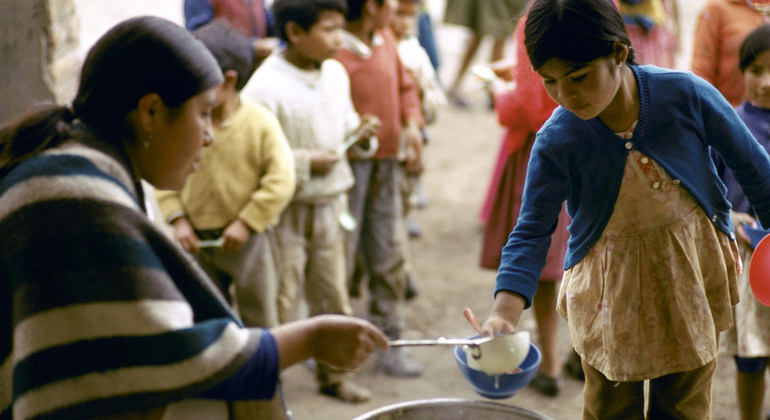New UN poverty report reveals ‘vast inequalities’ between countries
There are vast inequalities across countries, and among the poorer segments of societies, says a new UN report published on Thursday.
The 2019 global Multidimensional Poverty Index (MPI) from the UN Development Programme (UNDP), shows that, in the 101 countries studied – 31 low income, 68 middle income and 2 high income – 1.3 billion people are “multidimensionally poor”(which means that poverty is defined not simply by income, but by a number of indicators, including poor health, poor quality of work and the threat of violence).
“Action against poverty is needed in all developing regions”, the report states, noting that Sub-Saharan Africa and South Asia are home to the largest proportion of poor people, some 84.5 per cent.
Within these regions, the level of inequality is described as “massive”.
Read more here.
Mass measles vaccination campaign begins in Ebola-hit DR Congo province
Health workers have started a massive measles vaccination campaign in north-east Democratic Republic of the Congo (DRC), a region that’s in the grip of the second deadliest Ebola virus outbreak on record.
UN Children’s Fund UNICEF said on Thursday that it aims to inoculate 67,000 children in Ituri province.
They’re just a small fraction of the 400,000 people displaced by an upsurge in communal violence and clashes between Government forces and non-State armed groups in the resource-rich area.
Here’s the full story.
‘Unlock opportunities’, UN chief urges on World Population Day
As the number of people on the planet continues to rise, UN Secretary-General António Guterres marked World Population Day by highlighting the close link between the 2030 Agenda for Sustainable Development and demographic trends – urging everyone to “unlock opportunities for those left behind and help pave the way for sustainable, equitable and inclusive development for all”.
“For many of the world’s least developed countries, the challenges to sustainable development are compounded by rapid population growth as well as vulnerability to climate change”, he said in a statement on Thursday. “Other countries are facing the challenge of aging populations, including the need to promote healthy active ageing and to provide adequate social protection”.
More on World Population Day here.
In Mozambique, it’s ‘a matter of the heart’ says Guterres, lauding the cyclone-struck nation’s ‘undeniable moral authority’
Arriving in Mozambique to express solidarity and see for himself the damage wrought by two back-to-back cyclones earlier this year, UN chief António Guterres on Thursday said “undeniable moral authority” lay with its people, who had borne the brunt of a disaster linked inexorably to climate change, and a warming world.
“For me, visiting Mozambique is a matter of the heart”, he said to reporters after meeting President Filipe Nyusi, recalling previous trips as Portugal’s Prime Minister, as High Commissioner for Refugees, and now as Secretary-General, where he “always felt at home” among friends, “I would even say, among brothers.”
Read about it here.
And if you missed our special report from Mozambique on Wednesday ahead of the UN chief’s visit, read it here.
UN migration agency describes refugees’ ‘misery’ in Bangladesh
Heavy monsoon rains continue to batter refugees in southern Bangladesh where UN aid teams on Thursday reported six landslides in just 24 hours and more people forced to leave their damaged shelters.
Seven days after lashing camps in Cox’s Bazar, the International Organization for Migration (IOM) said that about 1,000 people had been affected by severe weather in the past 24 hours, causing “misery” for already vulnerable communities.
Teams are working day and night to provide emergency services to those affected, IOM reported, while also warning about worsening damage to paths, bridges and drainage systems.
According to the agency, more than 45,000 people have been affected by monsoon damage so far this year, compared to 55,000 impacted during the whole of last year’s rainy season.
A role for all in protecting freedom of expression, says UN rights expert
Amid ongoing threats and violence against journalists, UN-appointed rights expert David Kaye has led calls for all countries “to create enabling environments” for freedom of expression, in both digital and traditional media.
In a joint declaration issued by global rights experts, Mr. Kaye, who is the Special Rapporteur on Freedom of Opinion and Expression, urged States to recognize people’s right to use the Internet as “an essential condition” for them to express their views.
At the same time, the experts’ joint declaration also urges private firms to respect these rights, while also calling for independent oversight, transparency and accountability.
Listen to or download our audio News In Brief for 11 July on SoundCloud:









